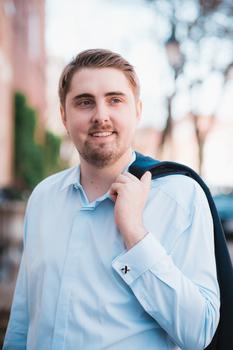Keil Eggers emphasizes the role of mutual understanding and respect to fostering peace.
Throughout his undergraduate and graduate years, Eggers recognized the critical role of fostering mutual understanding and respect between conflicting parties to create long-lasting peace. It was these interests that initially drew this University Scholar to the Jimmy and Rosalynn Carter School for Peace and Conflict Resolution as an undergraduate in the Honors College; it is the same interests that brought him back for a PhD, which he completed last Spring. In the upper-division class he taught for Honors College students, "Us Against When: Exploring Peaceful Futures for the United States," he sought to share these interests with the next generation of Honors College students.

Jeffrey Zitomer: Where are you from?
Keil Eggers: I’m originally from Lawrence, Kansas but I now live in Arlington, Virginia.
Jeffrey: Was George Mason a big change from Kansas?
Keil: Actually, George Mason was pretty comparable to where I was living in Kansas. Lawrence is also a university town, and it has a little bit of the feel of Fairfax. I think the biggest change was the diversity at George Mason. There’s a lot of people from different places and different cultures.
Jeffrey: What are you passionate about?
Keil: Professionally, I’m really passionate about connecting people and creating different infrastructures for people to come together and share new ideas. I’m a peacebuilder at heart, and peace is about relationships. Peace doesn’t exist as a final outcome, but rather as a continual process of discovering how we can live together.
I’m also a musician. I play guitar, I’m a front man, and I’ve been getting into producing, as well. My musical taste is very wide, I like a lot psych rock, funk, and world music from other cultures… I pretty much listen to everything! This summer I was working with an artist in Senegal, Amzee La Prince de Sud, and we recorded an album called “Cowboys in Dakar” together.
Jeffrey: Why did you choose the Carter School?
Keil: Initially, I was doing International Politics but I didn’t feel like it was trying to solve problems. I found out about the Carter School when I spoke with my advisor and I took Conflict 101: Conflict and Our World. Basically, I switched majors right away because I saw that it was a school that was trying to find creative ways to solve long-standing conflicts instead of supporting only one side.
Jeffrey: You have since graduated with your PhD from the Carter School. Why did you choose to continue your education at the Carter School?
Keil: My scholarship and practice were in a niche, experimental area and the Carter School was the only peacebuilding program that would allow me to continue and support my work. Not a lot of schools are open to that degree of creativity. I was also offered a generous Peace Engineering Fellowship that presented a great opportunity to further develop my work in the Carter School’s Peace Engineering Lab.
Jeffrey: What course had the greatest impact on you?

Keil: Aside from Conflict 101: Conflict and Our World, which changed my life, I think the other course that had the most impact on me was a counternarratives master’s course. At the time, I was very involved with organizing a political group on campus and the course was the first time I began to think about conflict through a narrative lens and understand that the same conflict can be narrated from multiple perspectives and that the story you tell is closely related to power dynamics in the conflict. These were elements I took up again in my PhD studies when I worked with the Narrative Transformation Lab.
Jeffrey: How did the Honors College prepare you for your success at George Mason?
Keil: The Honors College was a massive source of support and mentorship. I had the privilege of being a University Scholar during my undergraduate years, which is a top honor for incoming freshmen and helped pay for my education. I also took a lot of interdisciplinary courses that set the tone for my later academic appetites!
Jeffrey: What was your most impactful experience doing undergraduate research?
Keil: My undergraduate research was about pro-Palestinian social movements and I did a lot of my research as a scholar-practitioner, organizing on campus. The most impactful aspect was that I was able to attend the International Peace Research Association Conference in Istanbul, which led me to meet Johan Galtung, who is widely considered to be one of the fathers of the field of peace studies. I worked with him in his institute in Germany for a few years after that.
Jeffrey: Tell us about your PhD research.
Keil: What I explored during my PhD was sensemaking futures studies and complex systems in the context of peacebuilding in the United States. I worked with two, domestic peacebuilding associations to design a future peacebuilding scenario and tested the perceptions of the scenario with more than 800 respondents from five states at high-risk for political violence.
Jeffrey: You taught Honors 360: Multidisciplinary Topics (Us Against When: Exploring Peaceful Futures for the United States). What was it like to teach a course that you took as an undergrad?
Keil: It was a lot of fun! Teaching this class honed my future methodology in a way that I wished I had during my PhD! Working with Honors students was very inspiring and it taught me a lot about the potential directions of our country. It made me very hopeful.
Jeffrey: Do you have a message for anyone considering George Mason?
Keil: George Mason is an environment where you can really build the type of experience you want to have. The Carter School is the top program for Conflict Resolution and the Honors College is one of the best in supporting the achievement of your dreams.
